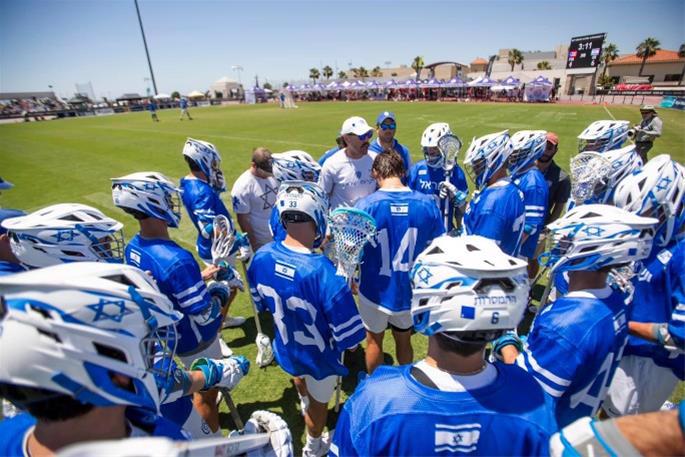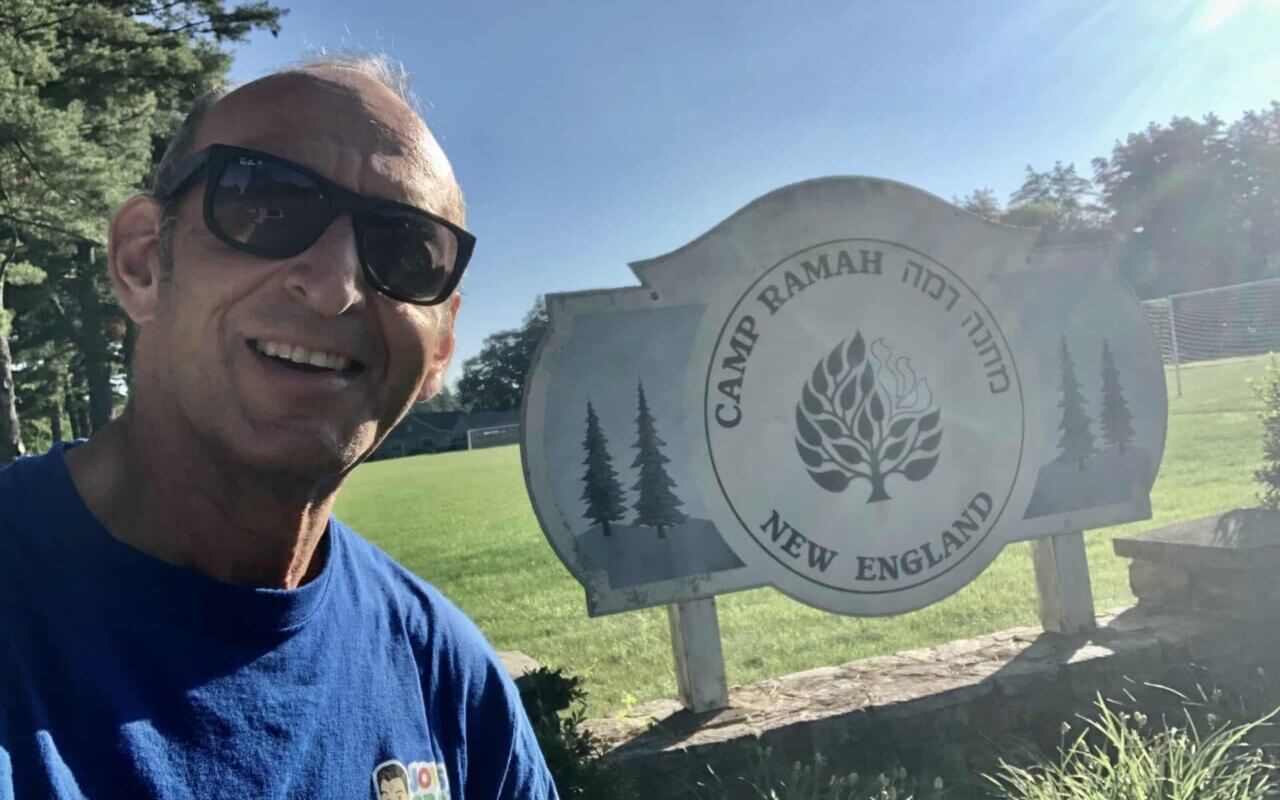Original Article Published On The Chabad.org
Player shares what he discovered at Chabad of Coronado
When Adam Fishman heard that the 2023 World Men’s Lacrosse Championship was coming to San Diego, he saw an opportunity to bring together three of his great loves: lacrosse, Israel and Chabad.
The former Ivy League lacrosse player, member of Israel’s National Lacrosse Team and an active member of Chabad-Lubavitch of Coronado worked tirelessly to bring 180 people to Chabad for a rousing Friday-night prayer service and a beautiful Shabbat dinner that included the entire team, coaches, relatives and community members.
Fishman’s desire to share Friday night at Chabad with the team comes from his own positive experiences there. Although he attended a Jewish day school as a child, “I had never gone to Friday-night services as a kid,” he told Chabad.org. “Here, this magical thing happens.”
Fishman detailed Chabad’s role in bringing Kabbalat Shabbat (“welcoming the Shabbat”) into his life, and the life of his wife, Allie and young child, Aiden—and his desire to share it with his fellow Jewish athletes. “The rabbi used to host dinner in his home every Friday night. The crowd got so big that they began hosting dinners at the shul. For me, Shabbat dinner was my re-entry point. It got me reconnected, and I wanted to share it with the team.”
Fishman overcame logistical challenges in planning the evening. “I knew the team had 60 guys and staff. I also knew our shul’s size. But I knew that with the rabbi’s help, we would make this happen,” he said.
Rabbi Eliezer and Zeldi Fradkin, co-directors of Chabad of Coronado, a California resort city on a peninsula in San Diego Bay, say they admire Fishman’s dedication and refer to him as the shadchan (“matchmaker”)—the driving force bringing Team Israel to Chabad during the quadrennial event featuring the top men’s field lacrosse teams.
“When he heard the team was coming to San Diego, he was very focused on bringing them here,” reported the rabbi. “Adam felt strongly that part of coming here needed to be coming to Chabad of Coronado for Shabbat. He did not want them to miss out on Lecha Dodi or the rest of the davening experience. No one questioned it.”

Outdoor Shabbat dinner for 180 at Coronado’s histroic Abadi Residence@The Baby Del
Photo courtesy Chabad of Coronado
A Heartfelt Speech to the Team
Fradkin, who served as mesader kedushin (“officiating rabbi”) at the Fishmans’ wedding and has enjoyed watching them welcome their first child, recounts Fishman’s heartfelt address to the players at dinner. He pointed out that playing lacrosse for Israel was “one of those pivotal moments when you get to represent Israel,” and implored his fellow lacrosse players to deepen their connection to Israel and Judaism as soon as possible.
“Don’t wait as long as I did for a connection,” Fishman said. He shared that, despite attending a Jewish day school, he never understood the reasons behind many Jewish rituals but began getting answers through classes offered by Chabad.
Fishman attended the Phoenix Hebrew Academy, an Orthodox Jewish day school in north central Phoenix, Ariz., and first discovered lacrosse at the JCC in Scottsdale. He played lacrosse in high school and at Dartmouth, where he led the Ivy League in shooting percentage before graduating in 2015. Fishman went to Israel in 2017 to try out for Israel’s national lacrosse team. While he didn’t make the squad in 2018, his persistence paid off and he made the 2019 World Championship box (indoor) lacrosse team.
The Phoenix native came to Coronado with his wife during the coronavirus pandemic. It was a homecoming of sorts. Fishman spent summers of his youth in Coronado, where both sets of grandparents had vacation homes. Coronado is located on a peninsula near San Diego, and is bordered by the Pacific Ocean and the San Diego Bay. It hosts such U.S. Naval institutions as the Naval Amphibious Base, Naval Air Station North Island and Navy Lodge North Island.
Fishman, now 30, has worked for a strategy-consulting firm and various entrepreneurial ventures. He is now in the field of gratitude-based leadership development and is an active member of Chabad or Coronado.

The Israel National Lacrosse team, coaches, relatives and community members spent Friday night at Chabad
Photo courtesy Israel National Lacrosse
Playing and Praying Together
Solomon Krevsky of Harrisburg, Pennsylvania came to San Diego with his wife, Katy, to watch their son, Max—who plays lacrosse at Yale University and is part of Team Israel—play lacrosse. Krevsky enjoyed watching the players come together at Chabad much as they had done on the playing field all week. “Seeing everyone cheering together for the boys for a week, then davening together in unity was meaningful.”
“Seeing these guys talking about the intricate details of lacrosse, and then all of a sudden walk into the Chabad House and sing “Shalom Aleichem” at the Shabbat table with their arms around each other with so much ruach and passion … This is what it is all about, says Solomon Krevsky”
While he is used to spending time with lacrosse players at Yale, Max Krevsky notes that the Team Israel experience was unique: “I got to interact with 22 other Jewish guys who were similar but different. They were interesting and awesome!”
He said he enjoyed getting to know two of his Israeli teammates, Ori and Ronen, and eating Shabbat dinner “right on the beach.” The Jewishly connected Krevsky has studied Yiddish for three semesters at Yale (“It was my grandfather’s first language”), and he and a fellow lacrosse teammate attend Chabad activities and services, where “there is always great food and energy.”
Dan Kraft, father of team member Joey Kraft and board chair of Israel Lacrosse, described the dinner as “a beautiful evening.” He appreciated that it was the first opportunity for extended family members to get together, meet and bond. Kraft passionately shared the three pillars of Israel Lacrosse: growing the game in Israel, connecting Diaspora Jews to Israel in unique ways, and competing on the international stage. He noted that this was not Team Israel’s first experience with Chabad. While they were competing in Ireland, Chabad of Dublin helped Team Israel secure kosher food at a tournament in Limerick, an Irish city 124 miles southwest of Dublin with no Jewish infrastructure.
Players, coaches and members of the Chabad community were pleased with Team Israel’s success at the 2023 World Lacrosse Championship. They won their first four games against Sweden, the Philippines, Puerto Rico and the Czech Republic. Team Israel held on for a 6-5 win against Ireland in the first round of the playoffs; its first loss came at the hands of the United States team. Israel came in an impressive seventh out of 30 teams.
There were other victories along the way: The team’s requests and prayers were answered as no games were scheduled for Shabbat, and their Friday-afternoon game ended with plenty of time to get to the Chabad House for Shabbat dinner. The rabbi and members of the Chabad community cheered on the team at several lacrosse games. One parent even noted, perhaps playfully and perhaps seriously, “If we continue winning, it can be attributed to the big ruach [“spirit”] of Friday night!”







